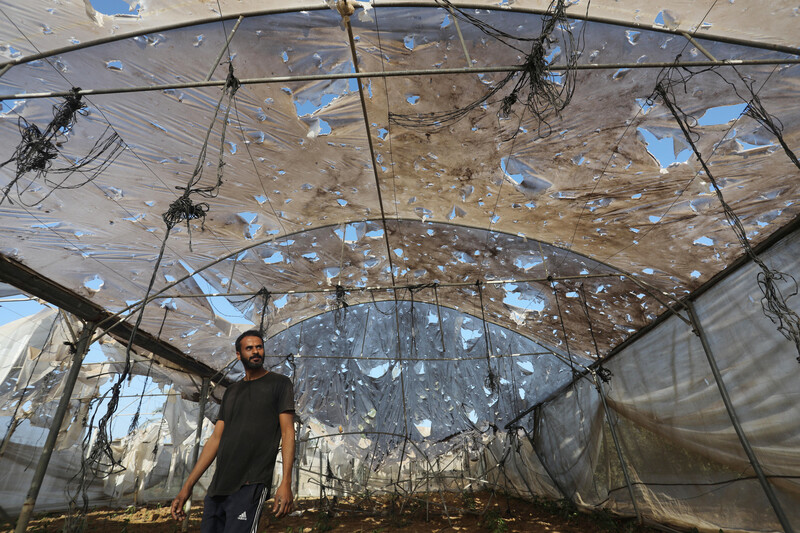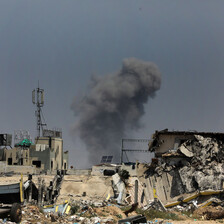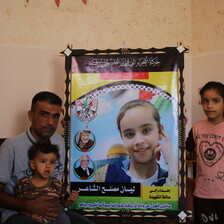The Electronic Intifada 10 November 2022

Israel attacked the Gaza Strip at around 3 am on 4 November.
APA imagesThe weekend had finally arrived.
And the best thing about weekends is that I get to spend time with my 5-month-old nephew Yahya.
He and my sister Inas visit us every weekend at our family home in the Maghazi camp in central Gaza.
But this past weekend, I wish they hadn’t.
On 3 November, around 10 at night, we were all gathered in the living room talking about how the Israeli drones were flying especially low and loud.
Though drones are a cursed part of every Palestinian’s life in Gaza, I’ve never gotten used to them. The buzzing makes it difficult to study and work, and I have to sleep with a fan on, even in winter, to block out the noise.
More than an annoyance, though, the drones are a deadly threat. A reminder that the Israeli occupation is always watching us from above, ready to kill at any moment.
The discussion was interrupted when my sister asked who wanted to feed Yahya. I gave him a bottle of milk and rocked him to sleep, singing a song to him to obscure the buzz of the drones, even just a little bit.
A rude awakening
We all headed off to bed, with Yahya and my sister upstairs, but we were not asleep for long.
Around 3 am, I awoke to the sound of a huge explosion.
I immediately thought of Yahya. I could barely get out of my bed before the second explosion took place. The electricity went out. I reached for my phone to use the flashlight, but the third explosion was so strong that the window above my bed shattered, covering my body and pillow in glass.
Two more explosions followed. The way it sounded, it was like the Israeli planes were firing two missiles for each explosion.
I could hear glass shattering, dirt and bricks falling, screams. It had been less than a minute.
I made my way upstairs, to Inas and Yahya’s room. I heard him before I saw him: bawling, his face red from screaming.
We went into the “safe area” of our house, which is not actually safe at all. It’s just a hallway that we tell ourselves is safe because it doesn’t have windows. But do windows really matter when the whole house is shaking from explosions?
Everyone was in shock, terrified, but we did our best to calm Yahya. We sang, clapped, and laughed to try and lessen his fear.
I later learned that when Yahya woke after the first explosion, my sisters covered him with their bodies to protect him from harm.
After about an hour in the hallway, Yahya went back to sleep and I checked on the rest of the house.
Windows were shattered in every room, and cracks had formed along several walls.
Destruction
The next day, I went to the mosque for Friday prayers. Our street was unrecognizable: covered with mud, bricks and rocks that had traveled from the impact site about 300 meters away.
Neighbors were talking about the Israeli attack, what bombs were used, what planes were flown. These attacks are so numerous that we are now experts in planes and bombs.
After prayers I took a walk through the neighborhood. I could barely recognize al-Mamoura playground, where I grew up playing, where I had recently watched soccer matches on a big outdoor screen. The playground was now buried in dirt and rubble.
I thought about how this wasn’t even the first Israeli attack that Yahya had lived through. How, on 5 August 2022, when Israel attacked Gaza, Yahya had cried through the night.
It’s now been almost a week since this latest Israeli attack, and while fortunately there have been no reported deaths, English-language news coverage has been minimal to non-existent.
Meanwhile, we work to repair the damage to our home. We’re still picking up pieces of glass so tiny that they are embedded in our clothing, curtains and carpets. And only yesterday did we replace the glass on our windows. Until then, wind blew in the heavy rains through the curtains, and I rushed to clean up the water.
I’ve checked in on Yahya every day since the bombing. He is young, but the trauma from Israeli attacks has untold and lasting impacts on children. My hope is that he forgets it all.
And, as the weekend approaches, I look forward to holding Yahya again, singing him to sleep.
Abdallah al-Naami is a journalist and photographer living in Gaza.





